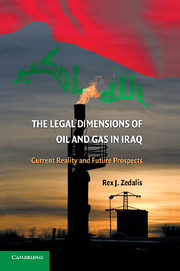Book contents
- Frontmatter
- Contents
- Foreword
- Acknowledgments
- Prologue
- PART ONE THE CONTEXTUAL BACKGROUND
- PART TWO THE COMPLICATIONS ASSOCIATED WITH IRAQI LEGISLATIVE MEASURES
- PART THREE CURRENT ISSUES AND POTENTIAL FUTURE PROBLEMS
- 7 The Matter of Creditor Claims: An Examination of United Nations Security Council Resolutions 1790 (18 Dec. 2007) and 1859 (22 Dec. 2008), and Their Predecessors
- 8 Central Government Authority to Strike Oil and Gas Development Agreements in the Absence of a Federal Framework Law
- 9 Distributing Profits in the Absence of a Federal Revenue-Sharing Law
- 10 Changing the Mix: Transition Fails and the Face of Iraq Is Altered
- Epilogue
- Index
9 - Distributing Profits in the Absence of a Federal Revenue-Sharing Law
Published online by Cambridge University Press: 07 December 2009
- Frontmatter
- Contents
- Foreword
- Acknowledgments
- Prologue
- PART ONE THE CONTEXTUAL BACKGROUND
- PART TWO THE COMPLICATIONS ASSOCIATED WITH IRAQI LEGISLATIVE MEASURES
- PART THREE CURRENT ISSUES AND POTENTIAL FUTURE PROBLEMS
- 7 The Matter of Creditor Claims: An Examination of United Nations Security Council Resolutions 1790 (18 Dec. 2007) and 1859 (22 Dec. 2008), and Their Predecessors
- 8 Central Government Authority to Strike Oil and Gas Development Agreements in the Absence of a Federal Framework Law
- 9 Distributing Profits in the Absence of a Federal Revenue-Sharing Law
- 10 Changing the Mix: Transition Fails and the Face of Iraq Is Altered
- Epilogue
- Index
Summary
INTRODUCTION
As indicated in Chapter 8, under some circumstances one may be compelled to determine whether the central government in Baghdad is empowered to enter into oil and gas development agreements in the absence of a national framework law on oil and gas. Similarly, it is possible to envision having to confront the question of whether and, if so, how revenues from oil and gas activities of the central government or its subcentral components are to be distributed in the absence of a federal revenue-sharing law of the sort examined in Chapter 5. The answer to this query is informed by various layers of analysis, with the first being, as with the matter of the central government's legal authority to enter development agreements, what the terms of the Iraqi Constitution provide directly or indirectly on revenue distribution. Several provisions of the Constitution speak to the matter in one way or another, many in a roundabout and oblique fashion. However, articles 111 and 112, examined earlier in several different contexts, and article 121 much more squarely address the issue of sharing oil and gas revenues.
Beyond the Constitution, reference might also be made to what the terms of extant subcentral governmental unit law provide. After all, inherent in the nature of the central or federal government unit would be the inclination to provide for the distribution of available revenues throughout the entire country.
- Type
- Chapter
- Information
- The Legal Dimensions of Oil and Gas in IraqCurrent Reality and Future Prospects, pp. 271 - 293Publisher: Cambridge University PressPrint publication year: 2009



